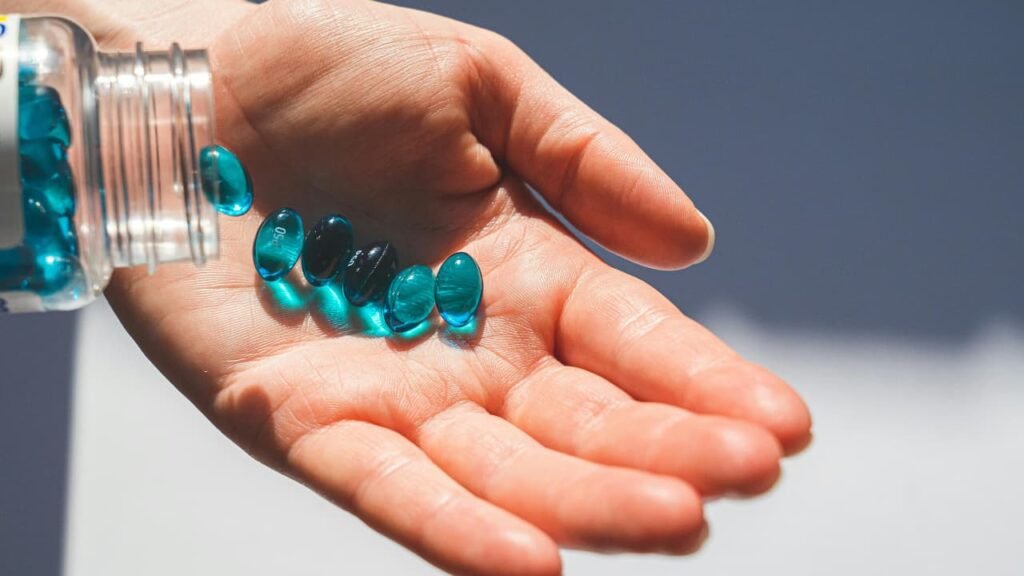Table of Contents
ToggleI’ve struggled with the keto diet myself, and I know how tough it can be. Finding the right balance of nutrients is key. That’s why I’m excited to share how supplements can help make the keto diet work better for you.
This guide will show you how the keto diet and supplements work together. You’ll learn how to reach your health and weight loss goals with more ease. Whether you’re new or experienced with the keto diet, this info will help you improve your journey.
Key Takeaways
- The ketogenic diet has been used since the 1920s to help manage epilepsy and is now popular for weight loss and other health benefits.
- Keto supplements can help support the body’s transition into and maintenance of ketosis, the metabolic state that drives fat burning.
- Certain keto-friendly supplements, such as MCT oil, electrolytes, and exogenous ketones, can enhance the effects of the ketogenic diet.
- Selecting high-quality, low-carb supplements from reputable brands is crucial to ensure safety and efficacy.
- Consulting with a healthcare professional is recommended when starting a ketogenic diet or incorporating supplements.
Understanding the Keto Diet

What is the Ketogenic Diet?
The ketogenic diet, also known as the “keto diet,” is a high-fat, low-carb plan. It has become very popular lately. It was first used in the 1920s for kids with epilepsy who didn’t get better with regular medicine.
This diet cuts out glucose, the main energy source for our cells, by limiting carbs. When you eat fewer carbs, your body starts using fat for energy instead. This is called ketosis and can help with weight loss, make insulin work better, and even help with some diseases like Alzheimer’s and Parkinson’s.
On a keto diet, you eat a lot of healthy fats. Foods like eggs, nuts, seafood, meat, cheese, oils, seeds, and butter are good choices. You eat fewer carbs, avoiding foods like starchy veggies, fruits, and grains.
| Keto Diet Variations | Macronutrient Ratio |
|---|---|
| Standard Ketogenic Diet | 70% fat, 20% protein, 10% carbs |
| Cyclical Ketogenic Diet | Periods of higher carb refeeds (e.g., 5 ketogenic days, 2 high carb days) |
| Targeted Ketogenic Diet | Allows adding carbs around workouts |
| High Protein Ketogenic Diet | 60% fat, 35% protein, 5% carbs |
By eating a ketogenic diet, your body goes into ketosis in 3-4 days. This means eating less than 50 grams of carbs a day. Being in ketosis can help with weight loss, make insulin work better, and help with some diseases.
The Role of Dietary Supplements

Following a ketogenic diet can lead to nutritional gaps because it limits food choices. Keto supplements can fill these gaps and support health for those on a keto diet.
“Supplements help fill the gaps, and for someone following keto, there are usually going to be gaps,” explains Wendimere Reilly, a registered dietitian nutritionist and the director of nutrition at InnovaCare Health in Clermont, Florida.
The ketogenic diet is high in fat, moderate in protein, and low in carbs. This can lead to vitamin deficiencies and mineral deficiencies. Keto supplements can be a key part of the diet to avoid these issues.
- Common vitamin and mineral deficiencies on the ketogenic diet include vitamin D, magnesium, calcium, and iron.
- Recommendations advise adults aged 19 to 70 aim for 600 international units (IUs) of vitamin D daily, while women need 310 to 320 milligrams (mg) of magnesium and men need 400 to 420 mg.
- Adults aged 19 to 50 need 1,000 mg of calcium daily, and women older than 51 have even higher calcium needs, at about 1,200 mg daily.
- Men aged 19 to 50 need 8 mg of iron daily, while women aged 19 to 50 need 18 mg. Pregnant people need 27 mg of iron daily.
By adding keto supplements to their diet, people on a ketogenic diet can close nutritional gaps. This supports their health and well-being.
Keto and Dietary Supplements
Common Ingredients in Keto Supplements
Following a ketogenic diet can be tough, and supplements can help. They make sure you get the nutrients you need and keep you healthy. Here are some key ingredients in keto supplements:
- MCT (medium chain triglyceride) oil: MCTs are fats that your body uses for energy easily. Coconut oil is a great source of MCTs.
- Omega-3 fatty acids: Omega-3s from fish oil help keep a healthy balance with other fats. This is key for a keto diet.
- Vitamins: A keto diet might not give you all the vitamins you need. So, supplements with vitamins B1, B6, B9, B12, A, C, D, and iron are common.
- Electrolytes: Electrolytes like sodium, potassium, calcium, and magnesium keep your body balanced. They help prevent the “keto flu” symptoms.
Some keto supplements also have digestive enzymes, fiber, and exogenous ketone supplements. These help with the transition to a low-carb, high-fat diet.
When picking keto supplements, choose ones without fillers and talk to a healthcare professional. This ensures they’re right for you.
Benefits of Taking Keto Supplements

Starting a ketogenic diet can be great for your health but has its challenges. Luckily, the right keto supplements can help with these issues. They support your overall well-being.
Electrolyte Balance
Low-carb diets like the keto diet can lower electrolytes like sodium, potassium, and magnesium. These electrolytes are key for staying hydrated, keeping nerves working right, and muscles moving. Supplements with these electrolytes can ease “keto flu” symptoms like tiredness, nausea, and headaches.
Energy and Performance
When your body uses fat for fuel instead of carbs, it’s in ketosis. Some research suggests that keto supplements can help people with diseases like Alzheimer’s and Parkinson’s. They give the brain an extra energy source.
Skin Health
The keto diet can make your skin healthier. Supplements with hydrolyzed collagen send important peptides to your skin. This can make your skin look better and reduce signs of aging.
Adding the right keto supplements to your daily routine can help with electrolyte balance, energy, and skin health. This makes it easier to meet your health and fitness goals on the keto diet.
“Keto supplements can be a valuable addition to a ketogenic diet, helping to address common challenges and support overall health and well-being.”
Choosing the Right Keto Supplements

When looking for keto supplements, picking quality products is key. There are many low-quality options out there. So, it’s vital to focus on supplements that meet certain standards. This ensures you get good value for your money.
Tips for Selecting Quality Supplements
Here are some important things to think about when picking keto supplements:
- Low in carbohydrates: Keto supplements should have few carbs to fit the keto diet. Stay away from those with sugars, like gummies or flavored drinks.
- Sourced from reputable brands: Choose brands known for quality and openness. Avoid supplements with big promises or seem too perfect, as they might not be trustworthy.
- Verified for purity and potency: Since the supplement industry isn’t closely watched by the FDA, it’s key to find products checked by trusted groups. Look for the USP or NSF seal of approval.
Remember these tips to confidently pick keto supplements. This way, you’ll find products that help your health and fitness goals.
“Keto-friendly supplements should be low in carbs to fit a keto diet. Avoid those with added sugars, like gummies or flavored drinks.”
– Reilly, nutritionist
“Choose brands known for their quality and honesty. Be wary of products that seem too cheap or make big promises. They’re likely not trustworthy.”
– Malone, registered dietitian
Conclusion
The keto diet has become very popular in recent years. Many people follow it for weight loss and better health. But, it can be hard to get all the vitamins and minerals you need because of its strict rules. That’s where keto supplements come in. They help fill nutritional gaps, balance electrolytes, and may help with health issues.
Research shows that the keto diet can help with weight loss and improve cholesterol levels and epilepsy symptoms. As more people try the keto lifestyle, using supplements to support it is becoming more common.
When picking keto supplements, make sure to choose ones that are high-quality and from trusted brands. This ensures they are safe and work well. By knowing how supplements fit into a keto lifestyle and picking the right ones, you can get the most out of the keto diet. This can lead to better health and wellness overall.
FAQ
What is the ketogenic diet?
The ketogenic diet, also known as the “keto” diet, is a diet high in fat and low in carbs. It cuts out glucose, the body’s main energy source. This makes the body use fat for energy instead.
What are the common ingredients in keto supplements?
Keto supplements often have MCT oil and omega-3 fatty acids. They also include vitamins like B1, B6, B9, B12, A, D, C, and iron. Plus, they have electrolytes such as sodium, potassium, calcium, iron, and magnesium.
Why do people take keto supplements?
People take keto supplements for many reasons. They help balance electrolytes and increase energy. They might also help with health issues like neurodegenerative diseases and skin problems.
What should I look for when selecting keto supplements?
When picking keto supplements, look for ones that are low in carbs. Choose products from trusted companies that share quality control details. Make sure they’re verified by groups like the U.S. Pharmacopeia (USP) or the National Science Foundation (NSF).





